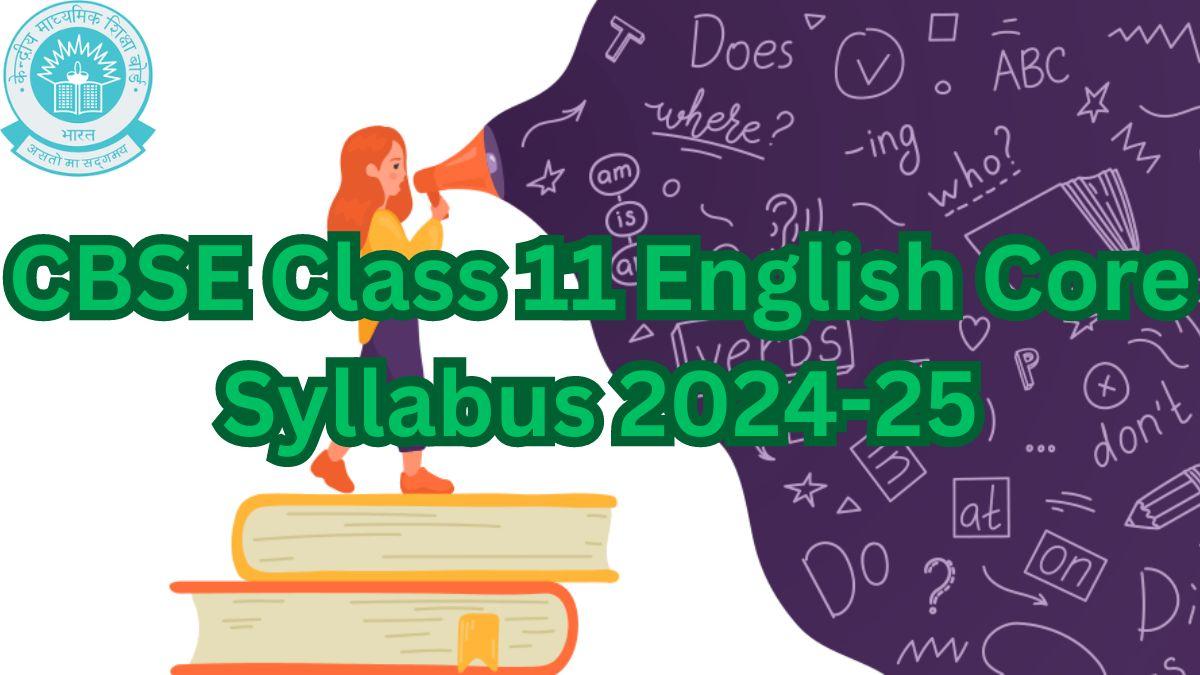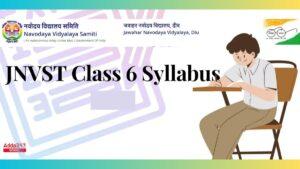The CBSE Class 11 English core syllabus 2024-25 has been issued by the Central Board of Secondary Education on its official website. The Class 11 English core curriculum of CBSE is highly important for students to know in order to score excellent marks in the exam. The English core exam paper is compulsory for every student studying in class 11th, that is, a student cannot progress into class 12th if they fail to pass class 11 English core exam paper.
CBSE Class 11 English Core Syllabus 2024-25
The CBSE class 11 curriculum consists of two English papers: English Core and English Elective. As the name suggests, the English Core subject is compulsory while the English Elective subject is optional and can be used as a second language paper. The board released the updated CBSE Class 11 English core syllabus 2024-25 to help students effectively organize their studies and improve their grades in the final exams. Candidates who are going to take the CBSE class 11 exam in 2024-25 session should check the detailed syllabus provided in the article below.
CBSE Class 11 English Core Syllabus 2024-25 Overview
The subject code for the CBSE class 11 English core exam paper is 301. The theory exam of English core subject holds the weightage of 80 marks while the internal assessment part accounts for 20 marks. The CBSE Class 11 English Core syllabus mainly evaluates students in 5 core areas, of which 3 areas are tested in theory examination while 2 areas are tested in internal assessment.
The Reading Skills, Grammar and Literature Text Book and Supplementary Reading Text skills are assessed in theory section while the Assessment of Listening and Speaking Skills, and project work is done in internal assessment.
Class 11 English Core Exam Paper Pattern CBSE 2024-25
The CBSE class 11 English core paper pattern is quite similar to its counterpart in class 12. Check the detailed paper pattern below.
| CBSE 12th English Core Paper Pattern | ||
| Section | Competencies | Total marks |
| Reading Skills | Conceptual understanding, decoding, Analyzing, inferring, interpreting, appreciating, literary, conventions and vocabulary, summarizing and using appropriate format/s. |
26 |
| Grammar and Creative Writing Skills |
Conceptual Understanding, application of rules, Analysis, Reasoning, appropriacy of style and tone, using appropriate format and fluency, inference, analysis, evaluation and creativity. | 23 |
|
Literature Text Book and Supplementary
Reading Text |
Recalling, reasoning, appreciating literary convention, inference, analysis, creativity with fluency, Critical Thinking. | 31 |
| TOTAL | 80 | |
|
Internal Assessment
|
Assessment of Listening and Speaking Skills
· Listening |
10
5+5 |
| · Project Work | 10 | |
| GRAND TOTAL | 100 | |
CBSE Class 11 English Core Detailed Syllabus 2024-25
The CBSE Class 11 English core syllabus for theory exam in detailed form is given below. The syllabus is divided into three main parts. Check all the parts with their marks below.
ENGLISH CORE CODE NO. 301 CLASS – XII 2024-25
Section A — 26 Marks
Reading Skills
I Reading Comprehension through Unseen Passages (10+8=18 Marks)
1. One unseen passage to assess comprehension, interpretation, analysis, inference and vocabulary. The passage may be factual, descriptive or literary.
2. One unseen case-based factual passage with verbal/visual inputs like statistical data, charts etc.to assess comprehension, interpretation, analysis, inference and evaluation.
Note: The combined word limit for both the passages will be 600-750.
Multiple Choice Questions / Objective Type Questions will be asked.Multiple Choice Questions / Objective Type Questions and Short Answer Type Questions
3. Note Making and Summarization based on a passage of approximately 200-250 words.
i. Note Making: 5 Marks
- Title: 1
- Numbering and indenting: 1
- Key/glossary: 1
- Notes: 2
ii. Summary (up to 50 words): 3 Marks
- Content: 2
- Expression: 1
Section B – 23 Marks
Grammar and Creative Writing Skills
II Grammar 7 Marks
4. Questions on Gap filling (Tenses, Clauses)
5. Questions on re-ordering/transformation of sentences
(Total seven questions to be done out of the eight given).
III Creative Writing Skills 16 Marks
6. Short writing task – Classified Advertisements, up to 50 words. One out of the two given questions to be answered (3 Marks: Format: 1 / Content: 1 / Expression: 1)
7.Short writing task –Poster up to 50 words. One out of the two given questions to be answered. (3 marks: Format: 1 / Content: 1 / Expression: 1)
8. Long Writing task: Speech in 120-150 words based on verbal / visual cues related to contemporary / age-appropriate topic. One out of the two given questions to be answered. (5 Marks: Format: 1 / Content: 2 / Expression: 2)
9. Long Writing Task: Debate based on visual/verbal inputs in 120-150 words, thematically related to contemporary, topical issues. One out of the two given questions to be answered. (5 Marks: Format: 1 / Content: 2 / Expression: 2)
Section C – 31 Marks
Literature Text Book and Supplementary Reading Text
This section will have variety of assessment items including Multiple Choice Questions, Objective Type Questions, Short Answer Type Questions and Long Answer Type Questions to assess comprehension, interpretation, analysis, evaluation and extrapolation beyond the text.
10. One Poetry extract out of two, from the book Hornbill, to assess comprehension, interpretation, analysis, inference and appreciation. (3×1=3 Marks)
11. One Prose extract out of two, from the book Hornbill, to assess comprehension, interpretation, analysis, evaluation and appreciation. (3×1=3 Marks)
12. One prose extract out of two, from the book Snapshots, to assess comprehension, interpretation, analysis, inference and appreciation. (4×1=4 Marks)
13. Two Short answer type questions (one from Prose and one from Poetry, from the book Hornbill), outof four, to be answered in 40-50 words. Questions should elicit inferential responses through critical thinking. (3×2=6 Marks)
14. One Short answer type question, from the book Snapshots, to be answered in 40- 50 words. Questions should elicit inferential responses through critical thinking. One out of two questions to be done. (3×1=3 Marks)
15. One Long answer type question, from Prose/Poetry of Hornbill, to be answered in 120-150 words. Questions can be based on incident / theme / passage / extract / event, as reference points to assess extrapolation beyond and across the text. The question will elicit analytical and evaluative response from the student. Any one out of two questions to be done. (1×6=6 Marks)
16. One Long answer type question, based on the chapters from the book Snapshots, to be answered in 120-150 words, to assess global comprehension and extrapolation beyond the text. Questions to provide analytical and evaluative responses, using incidents, events, themes, as reference points. Any one out of two questions to be done. (1×6=6 Marks)
CBSE Class 11 English Core Syllabus 2024-25 PDF Download
The official PDF for the CBSE Class 11 English Core syllabus 2024-25 has been provided below. Candidates can download the syllabus PDF for free by clicking the link given below.
| PDF Download Link |









 CUET BEd Syllabus 2026, Check Subject Wi...
CUET BEd Syllabus 2026, Check Subject Wi...
 Navodaya Syllabus for 6th Class PDF Down...
Navodaya Syllabus for 6th Class PDF Down...
 IPMAT Indore Syllabus 2026: Section-wise...
IPMAT Indore Syllabus 2026: Section-wise...









